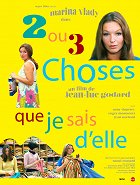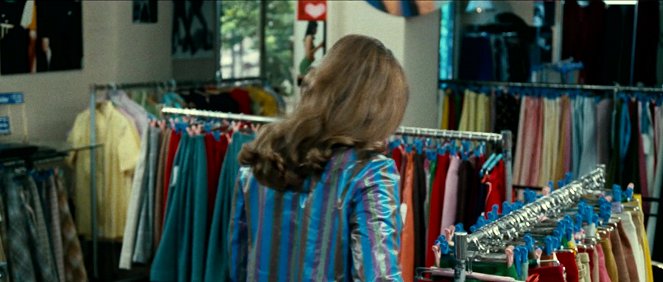Regie:
Jean-Luc GodardDrehbuch:
Jean-Luc GodardKamera:
Raoul CoutardBesetzung:
Marina Vlady, Anny Duperey, Jean-Luc Godard, Yves Beneyton, Claude Miller, Juliet Berto, Marie Cardinal, Raoul Lévy, Christophe Bourseiller (mehr)Inhalte(1)
Der Film ist eine experimentelle Mischung aus Dokumentar- und Spielfilm. Gezeigt wird Juliette Jeansons Leben als ein ständiges Hin und Her zwischen Arbeit, Freizeit und Gesellschaft. Juliette lebt mit ihrem Mann und Sohn in einem Pariser Vorort und arbeitet gelegentlich in einem Stundenhotel als Prostituierte, um mehr Geld für die neueste Mode zur Verfügung zu haben. In kurzen Episoden zeigt Godard ihr Privatleben, wie sie durch die Modegeschäfte der Stadt bummelt, in einem Café sitzt oder zum Friseur geht. Dabei wechselt der Film immer wieder zwischen Farb- und Schwarz-Weiß-Aufnahmen, zwischen realen Szenen und montierten Bildern. Der Film thematisiert auch die sozialen und politischen Veränderungen, die Paris in den 1960er Jahren erlebt, indem immer wieder Fragmente aus den Gesprächen unbekannter Passanten zu hören sind. Godard zeigt die Veränderungen der Stadt durch den Wandel von alten Stadtteilen, die modernisiert werden, und neu entstehende Stadtteile am Stadtrand. Dabei kommentiert er gezielt den Kontrast zwischen den neuen Hochhäusern und den Altbauten. Parallel dazu zeigt der Film auch politische Unruhen wie Studentenproteste und Demonstrationen. (arte)
(mehr)Kritiken (2)
There is nothing easier than living with the idea of taking everything around you for granted. So, what if a person starts thinking about all of this? What if the automated processes start to falter, what if the everyday reproduction of our social (and production) relationships starts to stumble? Well, nothing, I'll light a cigarette. Or I'll watch TV - thanks to modernization, everyone can afford it (even those who can't afford LSD). Advertising dreams are also dreams, and it's easy to forget things when you have them. Then a person doesn't even notice that their house is just another box of laundry detergent... The traditionally Godard-like sociological/ethnographic view of the film's protagonists, determined by the environment in which they live (on a lower level, Parisian suburbs, on a higher level, capitalist social formation), is enriched by a revolutionary approach to the relationship between the author-artist and their work. Thanks to the unique incorporation of voice-overs into the film, the artist establishes new connections and questions between themselves and the viewer, making conventional approaches unthinkable. Or, reflexive film sociology, in which Jean-Luc Godard examines the subject captured by artistic representation as if it were of scientific interest, and through this process, himself as the creator of the work - the artist, immersed in his time, just like Marina Vlady. /// The creativity with form and mise-en-scène is then taken to perfection - consider the famous example with the detail of coffee foam symbolizing the transience of human consciousness or M. Vlady's morning awakening, when the flag of France is unfolded from her pillow and blanket - indicating that what the film showed us in the case of the Parisian housing estate definitely does not apply to it alone.
()
I watch these movies, but it's as if I see nothing. I enjoy the various elements that Godard uses, for example, in this case, the narrator's voice, but as a whole, the film just didn't click with me, even though the subject is interesting and it is presented in an almost documentary style, or at least in a very realistic portrayal of scenes.
()

